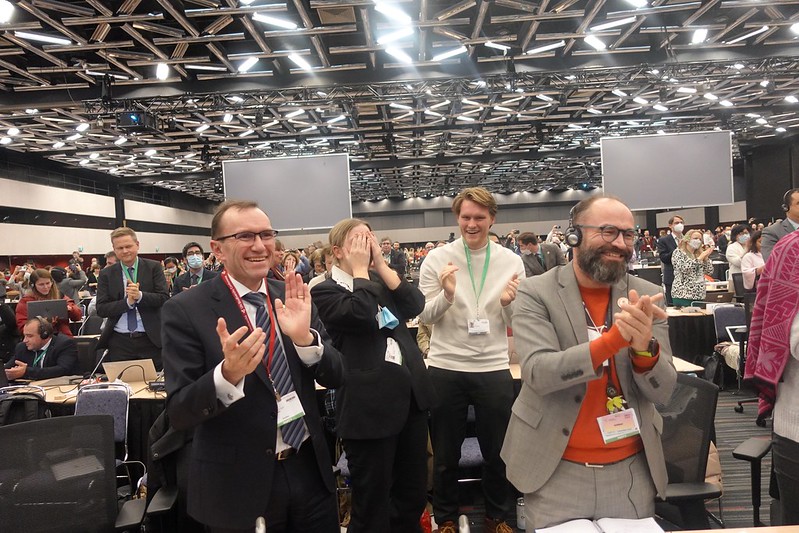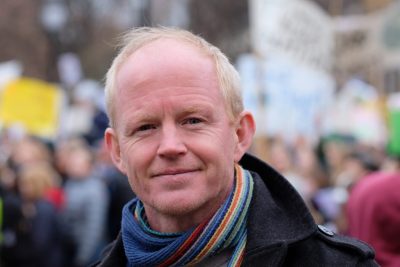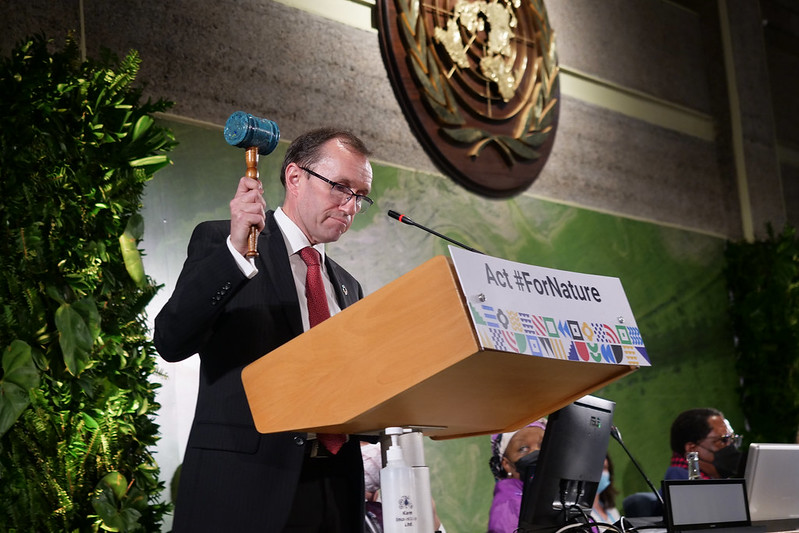NEWS ANALYSIS: On the day after flying home from his latest UN summit on climate and nature preservation, Norway’s government minister in charge of climate and the environment ordered the shooting of 21 more wolves. Last week he overturned state regulators’ ban on construction of a new motorway through a nature reserve near Lillehammer. Climate and environmental advocates are furious, and warning more civil disobedience to protest what they call the Norwegian government’s ongoing “nature-unfriendly double standards.”

The man now targeted is Espen Barth Eide, a veteran politician for the Labour Party who has served as defense- and foreign minister in earlier Labour-led governments. Since the fall of 2021, when Labour formed a now-troubled minority coalition with the Center Party, Eide has served as its climate- and environment minister. He traveled the globe last year attending and speaking at various high-level gatherings aimed at cutting carbon emissions, protecting the environment and, most recently in Montreal, reaching an international agreement on preserving 30 percent of the world’s nature.
Eide was among those praising the agreement, and taking part in another standing ovation for it after lengthy negotiations just before the Christmas holidays. The problem is that Norway, which for years has paid other countries to cut carbon emissions to help offset those from its own oil and gas industry, isn’t applying the 30 percent rule to itself. Despite all the platitudes in Montreal and at other UN summits last year, Norway won’t be practicing at home what it preaches abroad.

“No one has said that this (preserving 30 percent of nature) shall apply to every country,” Eide told Oslo-based newspaper Dagsavisen in December. “This is a global goal that doesn’t apply to each single country.” He noted that it would be much easier for Australia to protect 30 percent of its vast land area than for Singapore, because of their sheer differences in size. He and his negotiators also made sure that Norway’s actual land area would be as big as possible by including the Arctic archipelago of Svalbard, Bjørnøya and Jan Mayen. Around 17.6 percent of the Norwegian mainland and 3.6 percent of its offshore territory were under preservation orders as of last year.
Environmental and animal rights organizations quickly complained, arguing that it would be fully possible to preserve 30 percent of wilderness and natural habitats in Norway if there was political willingness to do so. In Norway, however, neither a Labour- nor Conservatives-led government has historically exhibited much willingness to hinder the economic development and job creation that comes at the cost of nature and the environment. Despite all the climate goals and budgets now and over past years, WWF claims in its recent “Living Planet Report” that Norway ranks among the worst in the world for using instead of preserving nature.
The complaints turned to howls when Eide’s ministry, on December 20, decided against halting another controversial wolf hunt. Eide himself had to defend the decision that ended up being challenged in court, pointing to how Norway’s Parliament had already approved wolf hunts and claiming that he was upholding a local commission’s recommendation on control of predators. It allowed killing up to 21 wolves, still an enedangered species, even within zones where they were supposed to be protected.
Eide’s ministry also later appealed a local court’s decision just before New Year to block the hunt, and then won in early February. “I’m satisfied that a unanimous appeals court sided with the state (that the wolf hunt was legal),” Eide stated in a press release, adding that the hunt was in line with international conventions and goals for managing Norway’s wolf population. He could note that neighbouring Sweden, earlier more restrictive on wolf hunts, had already completed a wolf hunt on its side of the border.

Opponents, which have appealed a similar case to the Supreme Court, continued to call the wolf hunt “scandalous” and claimed it sent all the wrong signals to the summit in Montreal. “Norway wants India to take care of its tigers and countries in Africa to take care of their lions,” Arnodd Håpnes of Naturvernforbundet (Friends of the Earth) told Dagsavisen. “At home we behave in a completely different manner when it comes to wolves.” Eide’s ministry also approved a controversial gaupe (lynx) hunt this month.
Most of the predator hunts are part of appeasing Labour’s government partner, the Center Party, which caters to a rural constituency that champions farmers and their long traditions of free livestock grazing that can be threatened by wolves, bears and now even eagles. Eide and his Labour Party, however, also risk irritating the Socialist Left Party (SV), on which both Labour and Center must rely for a majority in Parliament. “Wolves, like all other animals, are a critical part of nature and diversity of species,” contends Birgit Oline Kjerstad, a Member of Parliament for SV.
Now SV is among those furious over another decision by Eide and the rest of the Norway’s Labour-Center government, to build a new portion of the E6 highway through the delta of Lågen River north of Lillehammer. Called Lågendeltaet, the delta and its wildlife were believed to have been protected as a registered nature preserve, only to see Eide and his colleagues undermine the very value of such a legally protected area. He had also overturned a decision by Norway’s administrative agency for environmental issues, Miljødirektoratet, which had refused to allow the highway project in a nature preserve.
“The government is weakening nature preservation so that the highway authority can get its way,” Lars Haltbrekken, a former leader of Naturvernforbundet who’s now a Member of Parliament for SV, told newspaper Aftenposten. He reacted angrily to last week’s latest controversial decision that defies the very international agreement Eide recently applauded in Montreal: “What ridiculous deference to motorway interests.”

MP Arild Hermstad of the Greens Party (MDG) was outraged, especially over how the government decision comes such a short time after the same government helped push through what he called “a very ambitious global nature agreement” during the UN summit in Montreal.
“The climate minister is clever to speak well about the nature and say the right things (while abroad),” Hermstad told Aftenposten, “But you can’t build a motorway through a nature preserve and claim at the same time that you take the protection of nature seriously.”
Sofie Marhaug of the Reds Party agreed: “Eide can well boast about his role at international summits, but then he komes home and wants to build a motorway through a nature preserve. What a belly flop!”
Government credibility at issue
Eide’s and the Norwegian government’s credibility has thus been tarnished once again, as they’re accused of climate- and environmental hypocrisy. That’s nothing new, after an earlier Labour-led government failed to halt then-Statoil’s controversial investment in polluting tar sands projects in Alberta and fracking ventures in the US that later led to huge losses in addition to their carbon emissions. And both Labour and Conservative governments continue to firmly back Norway’s offshore oil exploration and production, even in the sensitive Arctic. Now they’re using the Russia’s war on Ukraine and Europe’s need for North Sea gas to justify all the oil and gas production that’s brisker than ever before and pumping record amounts of money into state coffers. Eide, meanwhile, was also part of opening doors for Norway’s state oil company Statoil (since renamed Equinor) abroad (Azerbaijan in 2013) when he was foreign minister in the former Labour-led government.

Eide admitted in his statement allowing the highway project that there’s supposed to be a “high threshold” for allowing such development in protected areas. “In this case, the government believes this is the best solution,” he stated in his February 10 announcement, timed for release just before last weekend and not available in English. Eide claims it will result in “better solutions for local- and heavy traffic” through the areas, and that a new tunnel will reduce the effect on birdlife in the area. His ministry points to other steps that will be taken to help “compensate” for the delta damage.
Transport Minister Jon-Ivar Nygård, also of Labour, pointed to Lillehammer’s growing population and labour market and to all the long-distance trucking between Oslo and Trondheim and Oslo and northern Vestlandet. Road improvements, Nygård concluded, are important.
Opponents note that economic and business interests are once again prevailing over environmental protection. They also note how Eide, just two days before allowing the motorway through a nature preserve, had spoken about the UN’s new nature pact at a seminar hosted by WWF. His ministry is also starting work on a national plan to comply with the UN pact.
“The new nature agreement will be followed up nationally and is an important tool for halting the loss of nature globally,” Eide stated. “All countries must contribute so that we can meet the goals (30 percent) that we have set for ourselves. The government has declared that climate and nature will form the framework for all policy, we’re ready to do the job.”
That came three days before he announced how his government will allow destruction of a nature preserve in order to make room for more cars and trucks. The government is also considering removal of protection orders on some rivers and waterfalls to meet demand for more hydroelectric plants, while conflicts continue over construction of wind turbines on scenic mountaintops and other wilderness areas. Calls are going out to halt other projects that can threaten nature along the Tyrifjord and Bjørnafjorden, on the vast Finnmarksvidda plateau in Northern Norway and the mountain plateau of Hardangervidda.

Eide himself has blamed Russia’s war on Ukraine and the resulting energy crisis for making climate cooperation much more difficult than ever. “We have a much more challenging world to navigate” than before earlier UN climate summits, he wrote in newspaper Dagens Næringsliv (DN) last fall, even as signs of climate change become ever more evident. He stressed in another DN commentary this week how “our allies and close trading partners will continue to want secure and predictable delivery of petroleum in the short term,” even as climate measures must succeed “if we’re to meet our climate goals.” To succeed, he believes, “we must be ambitious and realistic at the same time.”
That seems to be his explanation of how he can applaud ambitious climate and nature goals while abroad, and then make “realistic” political decisions at home. Climate and environmental activists aren’t impressed, with some organizations already promising civil disobedience as the highway project proceeds. Natur og ungdom (Nature and youth) has already warned they’ll chain themselves to the excavators and other construction equipment to stop it.
“What does ‘nature preservation’ mean if it only applies until you decide to do something else?” wonders the group’s leader Gina Gylver. She’s so angry that she sees no alternatives to civil disobedience. “It’s a serious step to take, but the government won’t only be moving forward with catastrophic development in a nature preserve. It’s also attacking preservation itself. This confirms that nature has never won once and for all.”
NewsinEnglish.no/Nina Berglund

